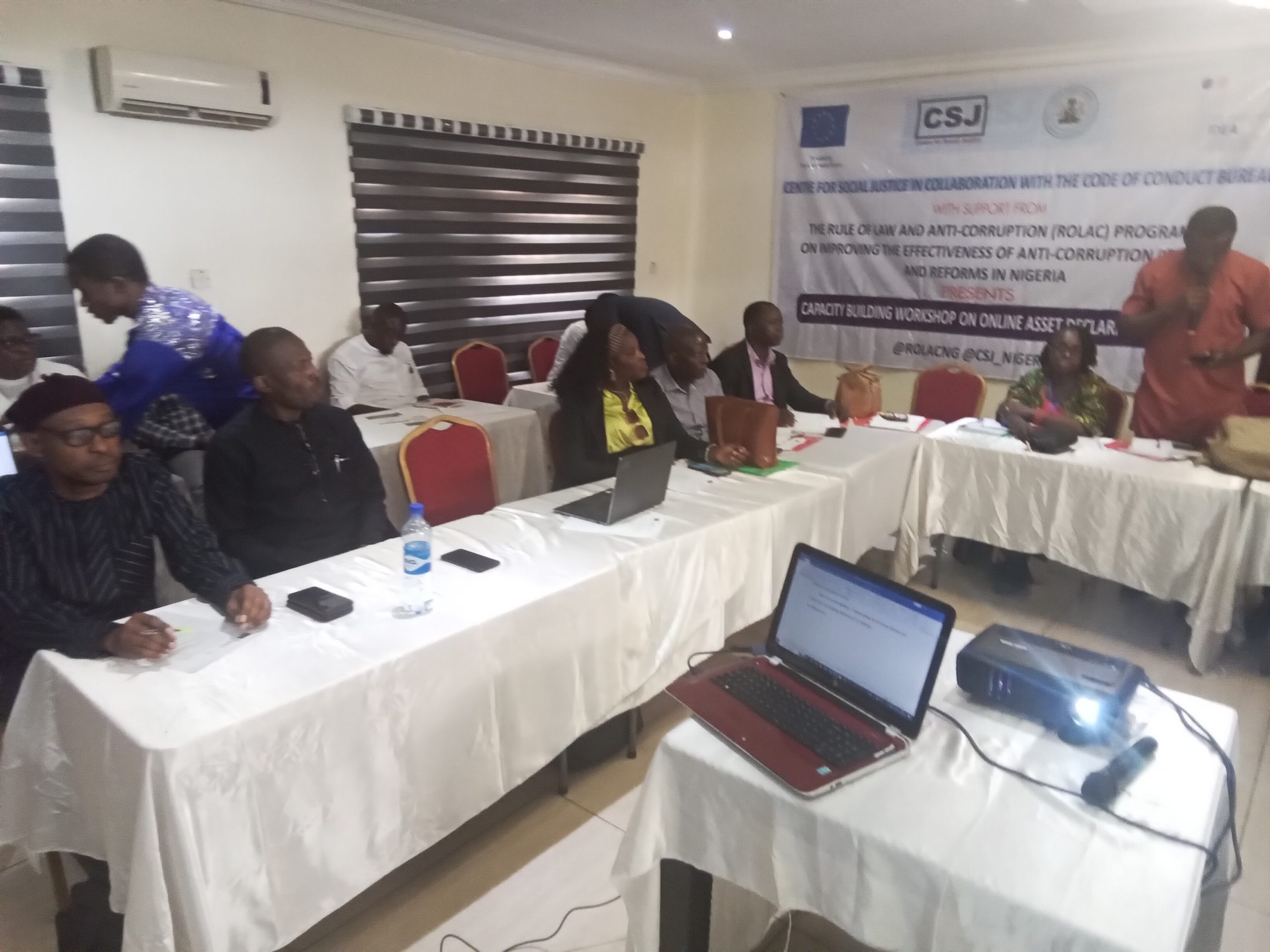By Lucky Isibor
The Chairman of the Code of Conduct Bureau (CCB), Dr. Abdullahi Bello Usman has described Assets Declaration by public officers as prescribed by the Constitution of the Federal Republic of Nigeria 1999 as amended as the bedrock of ethical governance, noting that it is not just a statutory obligation but a moral imperative.
Usman stated this while declaring open a two-day workshop which opened in Benin City, Monday, 7 March on “Improving the Effectiveness of Anti-corruption Processes and Reforms Capacity Building Workshop on On-line Assets Declaration System (OADS)” organised by the Code of Conduct of Conduct Bureau in collaboration with the Centre for Social Justice (CSJ) and the Rule of Law and Anti-Corruption (RoLAC II) programme being implemented by the International Institute for Democracy and Electoral Assistance (International IDEA) and supported by the European Union.
The CCB Chairman who was represented by the Head of Department, Education and Advocacy, Mr. Konyonda Edward pointed out that the CCB is transitioning from manual Assets Declaration to the digital platform to eradicate its susceptibility to human errors and inefficiency by deploying technology to eliminate bureaucratic bottlenecks.
“The CCB, as a cornerstone of Nigeria’s integrity framework, recognises that, declaration of Assets is not just a statutory obligation but a moral imperative. While it is an obligation for public Officers to comply, it’s an obligation on CCB to enforce compliance with the code of conduct for public Officers which Assets Declaration is a parcel and part. It is the bedrock of ethical governance. We cannot ignore the reality of our time. Manual systems are susceptible to inefficiency, opacity and abuse. This is why the transition to digital Assets Declaration Platform is not just an upgrade but a revolution. By leveraging technology we eliminate bureaucratic bottlenecks, reduce human interference and create an acceptable trail that deters malfeasance. This system will empower public officials to declare Assets seamlessly while enabling real-time monitoring by shareholders”.
While urging participants to take ownership of the new system of Assets Declaration, the CCB Chairman assured that the workshop will build their capacities that will address their concerns assuring that the Bureau will continue to innovate, collaborate and enforce compliance without fear or favour.
“This workshop, however, is not merely about deploying tools. It is about building capacity, fostering ownership and nurturing collaboration. Within these two days, we will: Demystify the technical and operational aspects of the on-line platforms; Address challenges – cybersecurity, accessibility and compliance – that may arise; Strengthen partnerships between institutions, civil societies and citizens to ensure collective vigilance. Anti-corruption reforms are not sole responsibility of government agencies. They demand a societal movement. When citizens actively demand accountability, and public servants lead by example, we create an eco-system where corruption cannot thrive.The CCB reaffirms its commitment to this cause. We shall continue to innovate, collaborate and enforce compliance without fear of favour. But we need – the Media, Civil Society, and every Nigerian – to be our allies in this fight”.
Welcoming participants to the workshop earlier, the Executive Director, Centre for Social Justice (CSJ), Eze Onyekpere (Esq) pointed out that the workshop is part of a delebrate partnership of CSJ and other development partners to develop learning and everyday use of materials for public officers in the operations of the new Online Assets Declaration System (OADS) and build capacity across Ministries Departments and Agencies (MDAs) at both the federal and state levels; adding that Edo, Anambra, Lagos, Plateau, Adamawa, Kano States and the Federal Capital Territory (FCT) have been chosen as the focal states.
While enumerating the objectives of the workshop, Onyekpere pointed out that the CSJ envisions a Nigeria where social justice informs public decision-making and guarantees respect for human rights and fundamental freedoms for everyone.
“For CSJ, the benefits that will accrue from this workshop are legion in consideration of our vision and mission. We envision a Nigeria where social justice informs public decision-making and guarantees respect of human rights and fundamental freedoms for all. The mission is to be a principal catalyst in mainstreaming social justice in public life through policy engagements and interventions that bring about economic, political and —Social reforms, rights enhancement and sustainable livelihoods. The vision and mission cannot be realized in a social milieu of pervasive corruption where an ethics in governance regime is not mainstreamed.
“The practical benefits expected to accrue from the OADS include ease of compliance for declarants – no need for collection of forms, going before judge, etc.,; ease of managing the process for the Bureaudoing away with the analogue and undue paper work; quality control ~ with a digitized system and relevant software, red flags and control issues will be easier and automatically raised; improving the verification process and interagency collaboration ~ with databases available on Bank Verification Number, National Identification Number, Land Registry, Drivers’ License, etc; facilitating the realisation of core objectives of the assets declaration system — more public officers will be able to declare their assets; reducing the cost of running the assets and liabilities declaration system for both the declarant and the Bureau; and improving transparency”.
In a good will message, the Executive Director of the Africa Network for Environment and Economic Justice ANEEJ, Rev. David Ugolor called for the collaboration of all the stakeholders in the anti-corruption struggle to ensure compliance to Assets Declaration as prescribed by law.
Representatives of various Ministries, Departments and Agencies, members of Civil Society Organisations (CSOs) and the media are participating in the two-day workshop.
